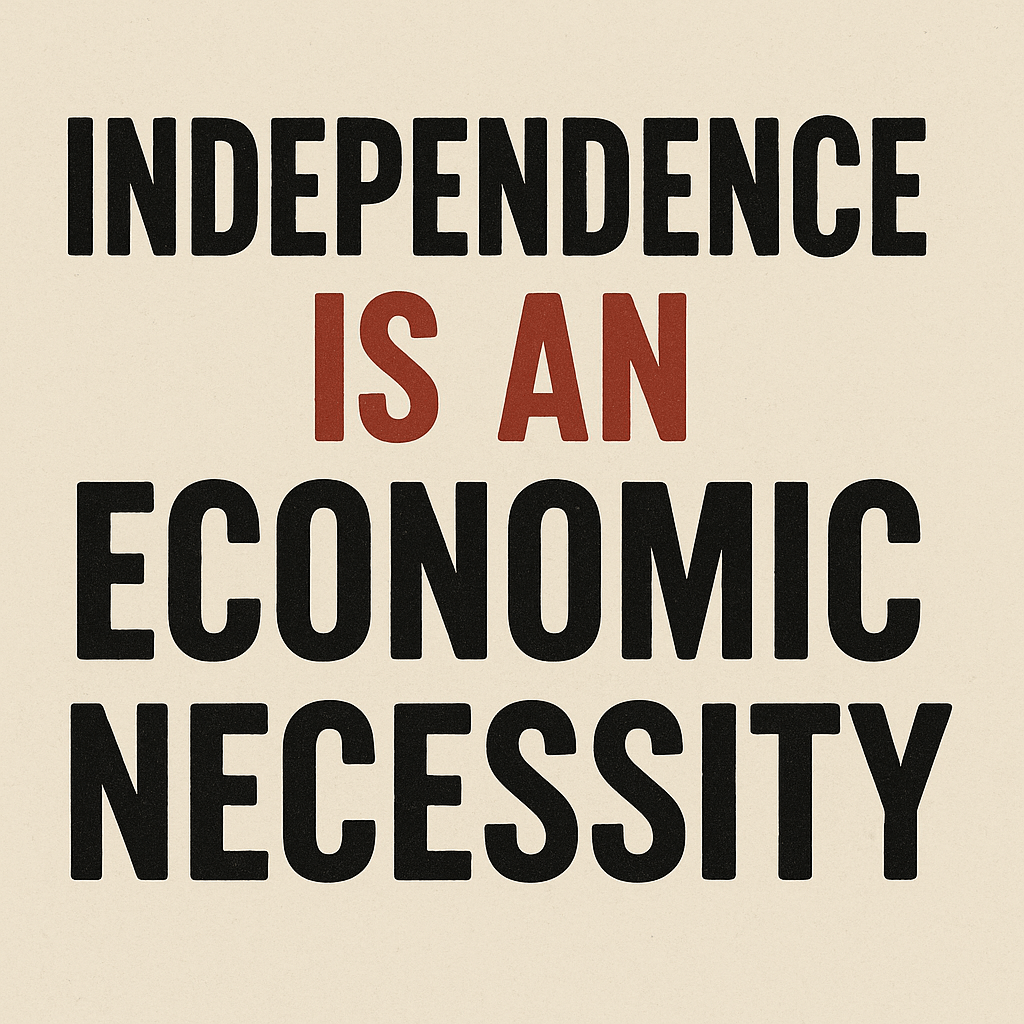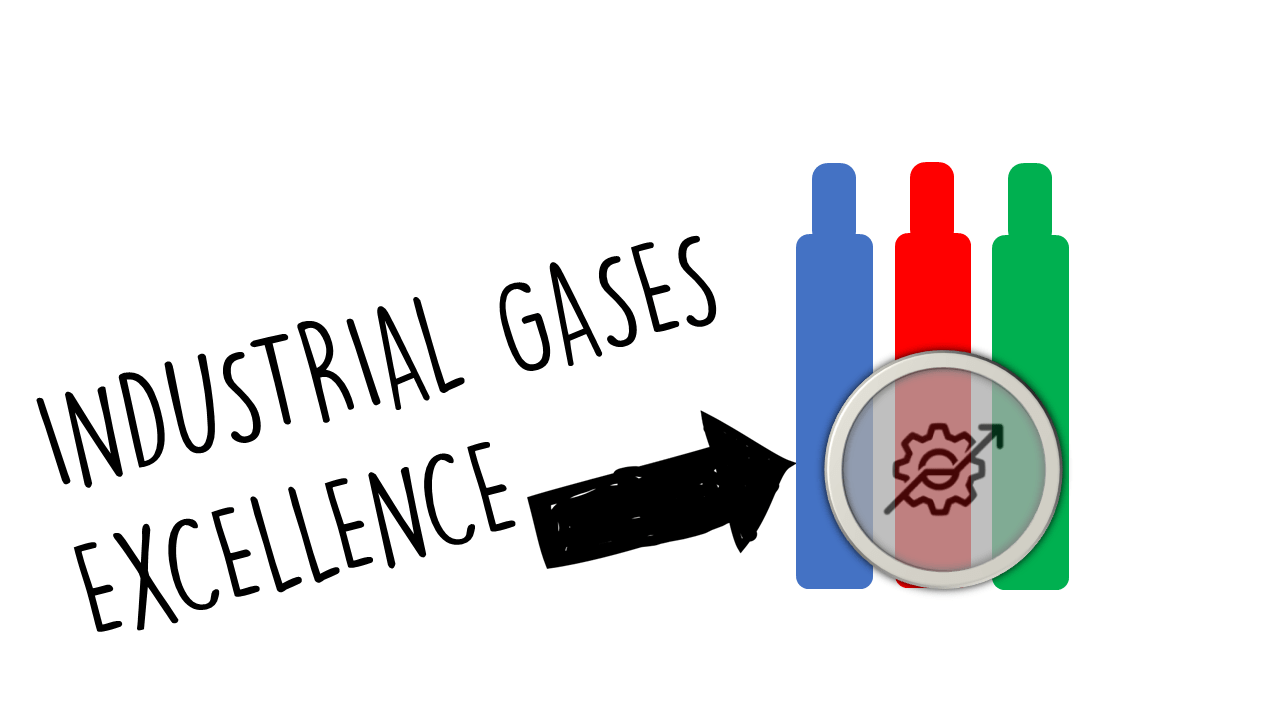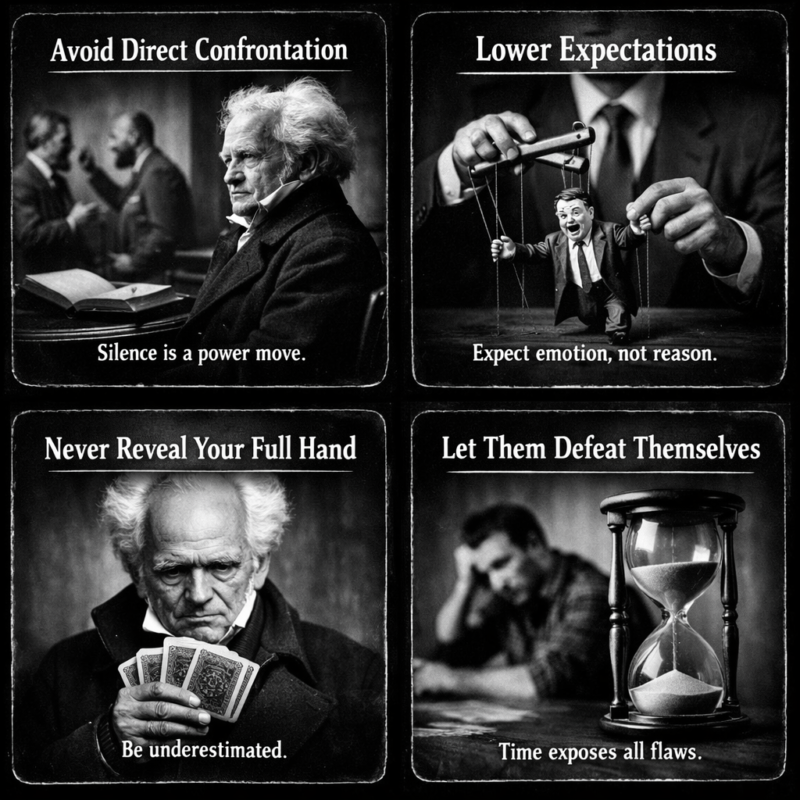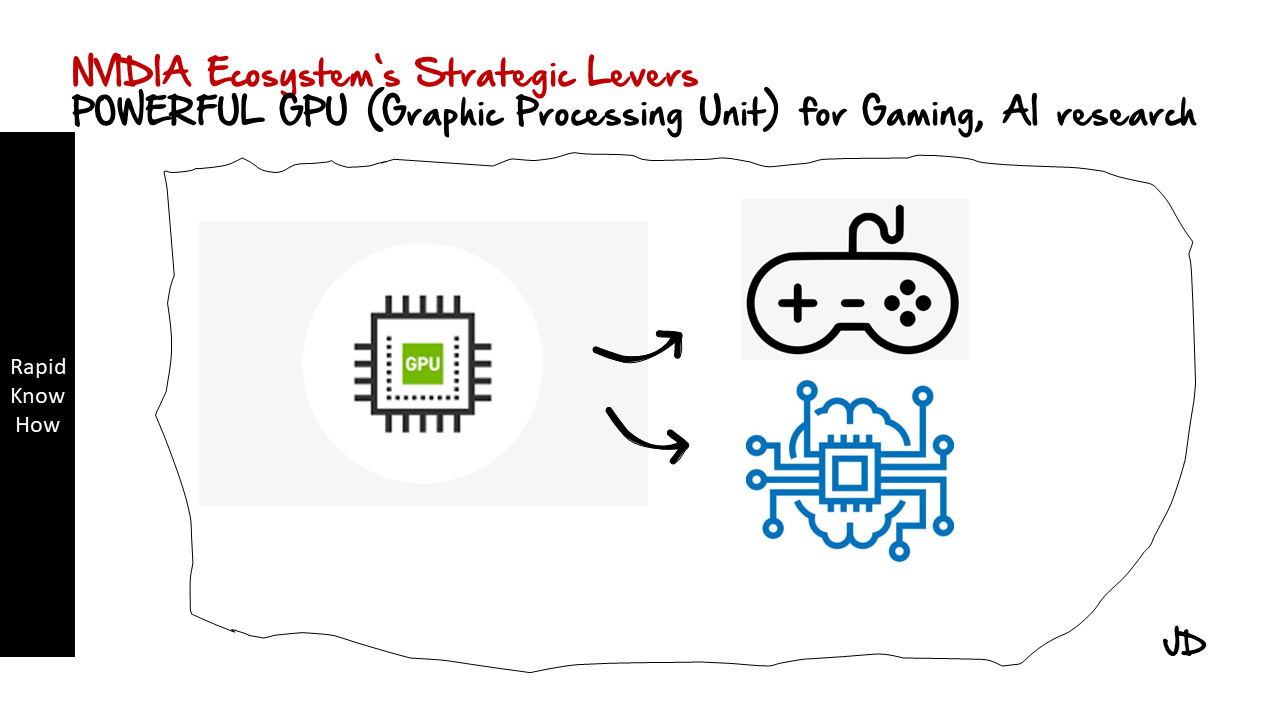Every Person Should Know and Apply
A Critical Essay
Most people drift through Business, Politics, and Life without a real strategy. They navigate on autopilot, react to events, and confuse motion with progress. But the ones who thrive — the Leaders, Builders, and Shapers — operate with a different rulebook. It is not mystical. It is practical. It is rooted in insight, discipline, and pattern recognition. Below are the 10 secrets that separate the ordinary path from the high-impact path. Each is a principle proven in real-world performance, whether in boardrooms, parliament, the marketplace — or at home.
1. Clarity Is Power: Define the Game You Play
Most people never win because they don’t even know what game they’re in.
Clarity is the meta-advantage. In business, clarity means: Which customers? Which value? Which result?
In politics: Which interest? Which alliance? Which power goal?
In life: Which identity? Which direction? Which non-negotiables?
The winners define the destination before they start the journey.
The losers let circumstances define them.
Clarity saves time, eliminates noise, and creates an unfair advantage.
2. Control the Input → Control the Outcome
People believe outcomes are random. They aren’t.
Outcomes are the compound result of inputs you control:
• Information you consume
• People you surround yourself with
• Systems you build
• Daily actions you repeat
Change the inputs — the outputs must follow.
This is the core of the RapidKnowHow logic: Success is a system, not a miracle.
3. Always Build Systems — Never Depend on Events
Hope is not a strategy. Waiting is not a strategy.
Systems win.
• In business: customer systems, cash-flow systems, licensing systems.
• In politics: messaging systems, influence systems, network systems.
• In life: health routines, money habits, decision frameworks.
If you rely on isolated opportunities, you get occasional wins and frequent disappointments.
If you build systems, you get predictable results. Systems compound. Events disappear.
4. Know the Real Power Structure — Not the Official One
In politics and corporations, the official chart is fiction.
Real power flows through informal circles, loyalties, and control over scarce resources:
information, access, and narrative.
If you understand the shadow structure, you understand why decisions happen the way they do.
The secret:
Never confuse representation with reality.
Power is rarely where it appears — it is where decisions originate.
5. The Person Who Drives the Narrative Wins
Facts rarely win. Interpretations do.
People think in stories, not spreadsheets.
If you frame the narrative, you steer perception. If you steer perception, you steer decisions.
This applies everywhere:
• In business: positioning beats features.
• In politics: narrative beats ideology.
• In life: self-story beats circumstances.
Your story becomes your strategy.
6. Speed Is the Ultimate Competitive Weapon
Slow kills.
In the AI Age, speed has outpaced size, legacy, and hierarchy.
The fastest person wins, the slowest loses — even if they start with more resources.
Speed means:
• Decide faster
• Test faster
• Learn faster
• Implement faster
• Iterate faster
The world now rewards the sprinter-thinker, not the perfectionist.
Perfection is dead. Momentum wins.
7. Incentives Shape Behavior — Always Follow the Money
Never judge what people say.
Judge what they are paid for, measured by, and protected by.
Incentives shape:
• Company culture
• Political behavior
• Family dynamics
• Personal relationships
If you misunderstand incentives, you misunderstand people.
If you follow the incentives, nothing surprises you again.
8. Focus Is a Superpower — Most Lose Because They Do Too Much
Distraction is the epidemic of the 21st century.
People chase 100 projects and complete none.
Focus is the ability to say NO aggressively.
The ultra-performers apply ruthless prioritization:
1 Goal
1 Strategy
1 System
1 Action per day
Focus simplifies the game.
Simplicity produces results.
Complexity produces excuses.
9. The Quality of Decisions Determines the Quality of Life
People obsess over activities. Winners obsess over decisions.
Decision quality is built on:
• Patterns you recognize
• Biases you remove
• Questions you ask
• Time horizons you apply
• Risks you accept
• Trade-offs you embrace
Most people avoid decisions because decisions carry responsibility.
But the absence of decisions creates chaos.
Decision-makers rule the world.
Decision-avoiders get ruled.
10. Your Network Is Your Lifeline — But Trust Is Your Currency
Everything we achieve is achieved through others.
But not all connections matter.
The true network is not the number of contacts — it is the circle of trust.
Trust has three components:
- Competence: You deliver.
- Character: You keep your word.
- Consistency: You show up.
If you master trust, doors open for you that are locked for everyone else.
Conclusion: The Game Is Rigged In Favor of the Prepared Mind
These ten secrets are not theoretical. They are practical tools — the operating system of high performers.
You don’t need talent, luck, or privilege to apply them.
You need clarity, discipline, and the courage to act while others hesitate.
The world is shifting: AI accelerates speed, uncertainty multiplies, and competition becomes global.
Those who apply these principles build advantage. Those who ignore them get overwhelmed.
In Business, you win by building systems.
In Politics, you win by understanding power.
In Life, you win by making your own decisions.
Life rewards the few who master these 10 secrets.
Be one of them.– Josef David
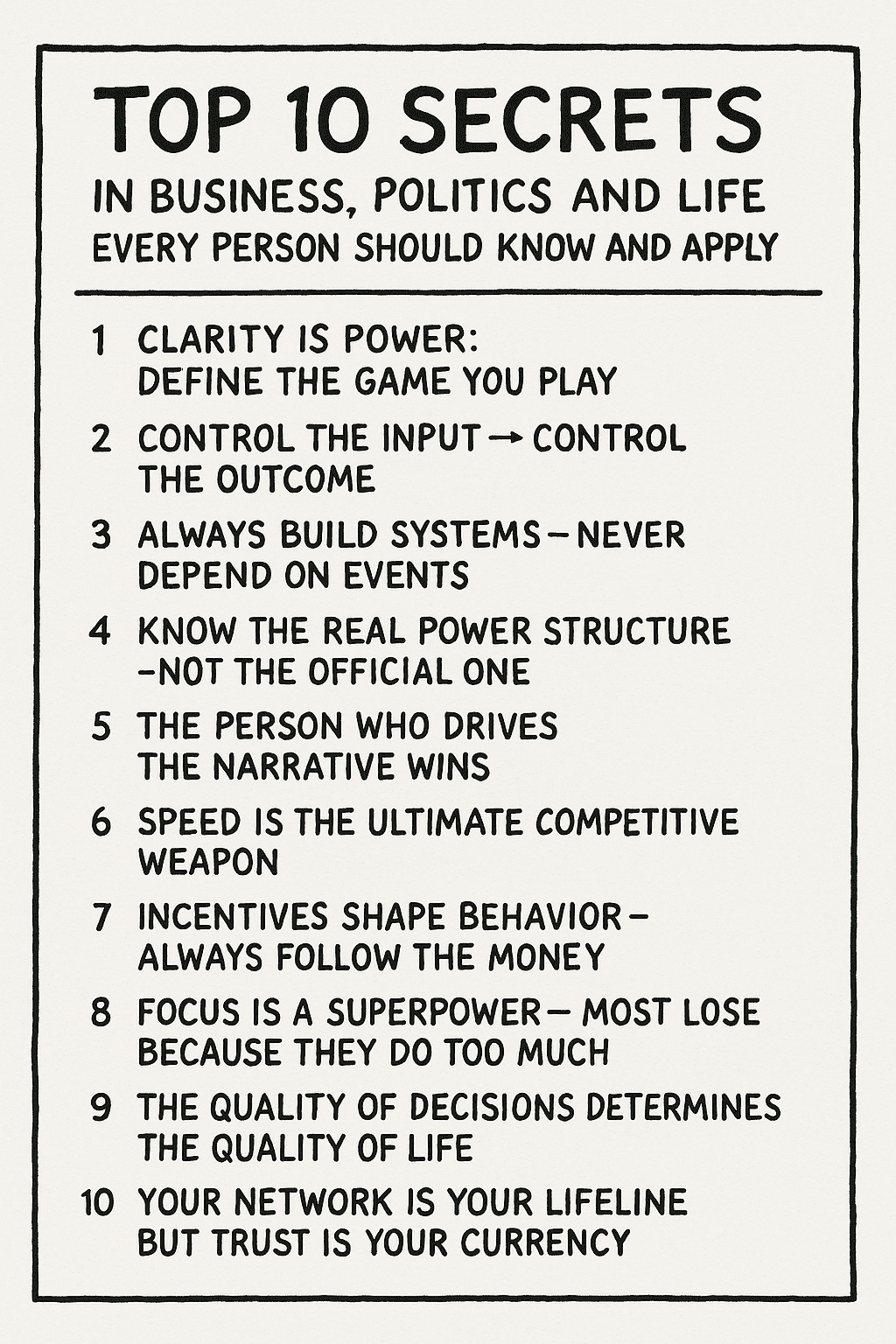
Applying the 10 Secrets to Real-World Case Studies
in Business, Politics, and Life — Contrasting Success and Failure
A Critical Strategic Essay
The 10 Secrets form a universal playbook. But their real power emerges when applied to real cases. Across business, politics, and life, the difference between success and failure is rarely luck — it is the (non-)application of these principles. Below is a critical analysis of how each secret plays out in real-world scenarios.
1. Clarity Is Power — Define the Game You Play
Success Case: Apple under Steve Jobs (1997–2011)
Jobs reduced Apple’s chaos into a 2×2 clarity matrix: Consumer/Pro vs Desktop/Portable.
That clarity killed dozens of pointless projects and made room for the iPod, iPhone, and iPad.
Clarity → Focus → Execution → Trillions in value.
Failure Case: Nokia 2007–2013
Nokia never defined whether it was in the phone manufacturing game or the mobile ecosystem game.
As a result, they optimized hardware while the world shifted to software ecosystems.
Confusion → Fragmentation → Collapse.
2. Control the Input → Control the Outcome
Success Case: Warren Buffett’s Information Diet
Buffett reads for hours daily, avoids short-term news, and focuses on high-quality data:
annual reports, shareholder letters, long-term trends.
His controlled input → consistent rational output.
Failure Case: Political Bubble Thinking (EU, US, 2018–2024)
Leaders surrounded by advisors who filter reality to protect power end up making decisions based on illusions.
COVID, migration, energy policy: the failures came from bad inputs, not bad intentions.
Garbage In → Disaster Out.
3. Always Build Systems — Never Depend on Events
Success Case: Amazon’s Flywheel Strategy
Bezos built a system where lower prices → more customers → more sellers → better selection → higher efficiency → lower prices.
It self-compounded for 20 years.
Failure Case: Start-ups built on “viral moments”
Many consumer apps (e.g., Clubhouse) went viral but had no system to retain users or generate revenue.
Event-driven success without systems always ends in collapse.
4. Know the Real Power Structure — Not the Official One
Success Case: China’s Parallel Power System
Understanding the CCP’s internal factions, not the official hierarchy, explains how leaders rise or fall.
Real power → informal alliances + loyalty networks + control over security apparatus.
Failure Case: EU Politicians Misreading Russia (2000–2022)
Europe assumed Russia’s official institutions mattered.
In reality, the power vertical was personalistic, informal, and kleptocratic.
Misreading real power → catastrophic energy dependency.
5. The Person Who Drives the Narrative Wins
Success Case: Volodymyr Zelenskyy (2022)
Zelenskyy turned Ukraine’s defense into a global narrative:
Freedom vs. aggression.
By controlling the story, he mobilized billions in support and global solidarity.
Failure Case: UK Government during Brexit Negotiations
Lack of consistent narrative created internal chaos:
economic arguments one day, sovereignty the next, fear appeals the day after.
Without a narrative, you cannot lead a country — or even a negotiation.
6. Speed Is the Ultimate Competitive Weapon
Success Case: Tesla during the EV Breakout Phase
While legacy automakers held long committees, Tesla iterated products and factories weekly.
Speed → cost advantage → technological lead → market dominance.
Failure Case: German Bureaucracy (Covid Vaccines, Infrastructure, Energy)
Slow decision processes turned a wealthy country into a slow-motion system.
Speed differential = disadvantage.
In modern reality, slowness is a strategic vulnerability.
7. Incentives Shape Behavior — Always Follow the Money
Success Case: Singapore’s Public-Sector Incentive Model
Ministers and top civil servants are paid competitive market salaries.
This removes corruption incentives and aligns national interest with public service.
Incentive alignment → world-class governance.
Failure Case: Austrian/Italian Public Sector (Reform 2010–2025)
Incentives reward compliance, not performance.
The result: bloated bureaucracy, protectionism, and low innovation.
Misaligned incentives → stagnation.
8. Focus Is a Superpower — Most Lose Because They Do Too Much
Success Case: Netflix’s Single Strategic Bet
Netflix dropped DVD rentals and focused fully on streaming — at a time when the idea looked insane.
Focus created a decade-long advantage.
Failure Case: General Electric 2000–2017
GE expanded into every sector: energy, finance, entertainment, healthcare, aviation.
The result: no focus, no identity, no strategic center → collapse of a global giant.
9. The Quality of Decisions Determines the Quality of Life
Success Case: New Zealand’s Early Covid Strategy
Fewer committees → fewer meetings → fast, high-quality decisions.
They acted early, clearly, and decisively.
Failure Case: Personal Life Example — Staying in Toxic Jobs or Relationships
Millions remain in environments that damage them because they avoid one decision:
leaving.
Non-decisions create suffering.
Decision quality is life quality.
10. Your Network Is Your Lifeline — But Trust Is Your Currency
Success Case: Silicon Valley’s Trust Networks
Founders, VCs, engineers, and operators operate on reputation and trust.
High trust + high competence = rapid deal-making and innovation.
Failure Case: Political Appointments Based on Loyalty, Not Competence
When networks become loyalty-based instead of competence-based, decline sets in.
Governments and companies collapse when trust = personal loyalty instead of capability.
Synthesis: Why Success Is Predictable — and Failure Avoidable
When you compare the cases, one thing becomes clear:
Success is not mysterious — it is systematic.
Failures repeat the same patterns:
• No clarity
• Wrong inputs
• No systems
• Misreading real power
• Losing the story
• Slow execution
• Misaligned incentives
• No focus
• Bad decisions
• Wrong networks
Meanwhile, success stories demonstrate the opposite — deliberate, disciplined, pattern-driven execution.
Three Meta-Lessons Across All Case Studies
1. The Future Belongs to the Fast, the Clear, and the Systematic
If you can define your game, act fast, and build systems, results follow.
2. Weak Leaders Focus on Appearances — Strong Leaders Focus on Structures
Shallow leaders chase headlines.
Real leaders build power, competence, and trust.
3. Life Is Strategy — Personal, Professional, Political
Your life today is the result of the systems, inputs, incentives, networks, and decisions you built in the last five years.
Your life in five years will be built on what you do today.
Conclusion: Apply the 10 Secrets or Get Crushed by Those Who Do
The world is speeding up. AI amplifies advantages and exposes weaknesses at scale.
Those who master the 10 Secrets become efficient, independent, and resilient.
Those who ignore them fall into predictable traps.
The best time to apply these principles was yesterday.
The second-best time is now. – Josef David

